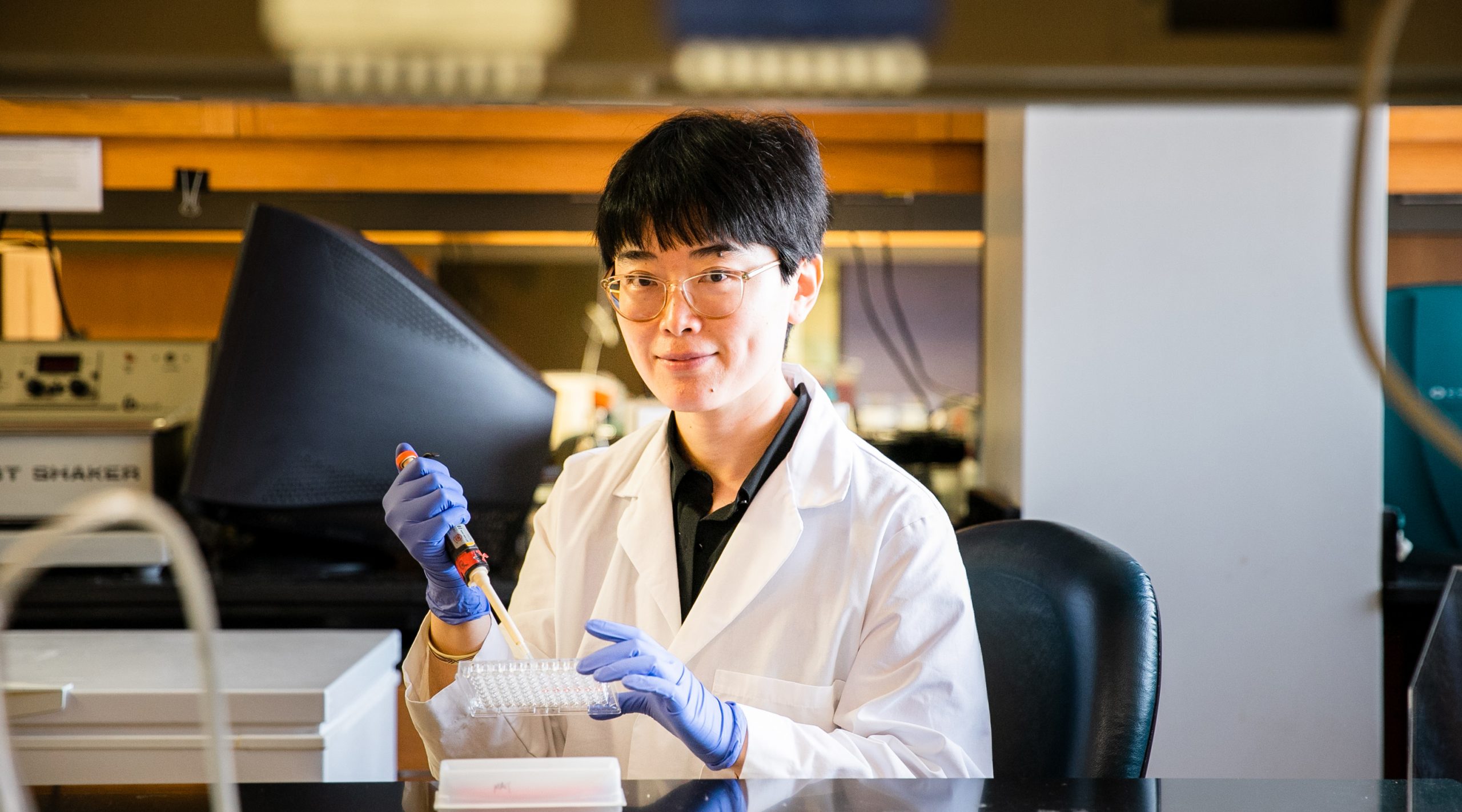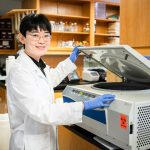Meng Zhao, Ph.D.
Assistant Professor
Arthritis & Clinical Immunology Research Program
Adjunct Assistant Professor of Microbiology and Immunology, University of Oklahoma Health Sciences Center
My 101
Recent success in cancer immunotherapy, including using Chimeric Antigen Receptor (CAR) T cells and immune checkpoint blockade, has demonstrated clearly the power of treating human diseases by modulating the activity of T cells, an important population of white blood cells in humans. I am interested in a unique group of T cells, the innate-like T cells. While it takes days for conventional T cells to develop and become fully functional, innate-like T cells are rapid responders and first-line defenders against invading pathogens. When T cells go awry, however, it can attack one’s own body and cause autoimmune diseases, such as rheumatoid arthritis. Our research has recently shown that unlike the villainous T cells, the innate-like T cells are heroic and protect us from autoimmune arthritis. Innate-like T cells, therefore, are promising targets for new immunotherapy.
Our work has also shown that these T cells have distinctive ways to generate and use energy, as compared with mainstream T cells. The research in my lab is focused on understanding how the energetic processes control or regulate the important functions of innate-like T cells. Our discovery will provide new strategies to specifically target the innate-like T cells in human diseases and help design next-generation precision medicine.
Research
My research interest is to understand the functions of innate-like T cells at the molecular level. These cell types, which share many features in common, include gd T cells, mucosal-associated invariant T (MAIT) cells and invariant natural killer T (iNKT) cells. These T lymphocytes are tissue homing and have rapid effector functions. They contain expanded populations in all individuals and will not cause graft-versus-host disease when transferred. Therefore, they are potential target populations for treating inflammatory diseases and for stimulating the responses to cancer. By defining the specific mechanisms underlying the unique functions of innate-like T cells, we can put forward new strategies for human immunotherapy.
Recently we have discovered that innate-like T cells exhibit distinct metabolic characteristics, which underlie the important functions of these cells during inflammation. We are interested in deciphering the mechanistic interaction between metabolic remodeling and immune functions in innate-like T cells during the pathogenesis of human diseases including autoimmune diseases and bacterial infections, in which we have shown that these cells play critical roles.
We will take advantage of cutting edge technologies including CRISPR-Cas9, novel genetically modified mouse models, metabolomic analysis, and single cell transcriptomic analysis. The long-term goal of our research is to understand the role of metabolic programs that regulate innate-like T cell response in human diseases.
Brief CV
Education
B.S., Wuhan University, Wuhan, HuBei, China, 2004
Ph.D., UT-Southwestern, Dallas, TX, 2010
Postdoctoral Fellow, La Jolla Institute, La Jolla, CA, 2018
Honors and Awards
NIH Postdoctoral Fellowship on Rheumatic Diseases, 2013-2015
AAI Young Investigator Award, La Jolla Immunology Conference, 2018
Travel Grant: EMBO Workshop – CD1/MR1: Beyond MHC-restricted lymphocytes, Oxford University, UK, 2019
Joined OMRF scientific staff in 2020
Publications
Recent Publications
Sok SPM, Pipkin K, Popescu NI, Reidy M, Li B, Van Remmen H, Kinter M, Sun XH, Fan Z, Zhao M. Gpx4 Regulates Invariant NKT Cell Homeostasis and Function by Preventing Lipid Peroxidation and Ferroptosis. J Immunol, 2024 August, PMID: 39158281, PMCID: PMC11408103
Zhao M, Kronenberg M. Innate-like T cells: connecting the dots linking microscopic intestinal inflammation to spondyloarthritis. Arthritis Rheumatol, 2023 July, PMID: 37488948, PMCID: PMC10615776
Zhao M, Zhou Y, Zhu B, Wan M, Jiang T, Tan Q, Liu Y, Jiang J, Luo S, Tan Y, Wu H, Renauer P, Del Mar Ayala Gutiérrez M, Castillo Palma MJ, Ortega Castro R, Fernández-Roldán C, Raya E, Faria R, Carvalho C, Alarcón-Riquelme ME, Xiang Z, Chen J, Li F, Ling G, Zhao H, Liao X, Lin Y, Sawalha AH, Lu Q. IFI44L promoter methylation as a blood biomarker for systemic lupus erythematosus. Ann Rheum Dis 75:1998-2006, 2016 November, PMID: 26787370, PMCID: PMC4955646
Selected Publications
Figueroa MG, Parker LM, Krol K, Zhao M. Distal Lck promoter-driven cre shows cell type-specific function in innate-like T cells. Immunohorizons. 2021 Sep 28;5(9):772-781. doi:10.4049/immunohorizons.2100079. PMID: 34583938
Zhao M*, Quintana A, Zhang C, Andreyev AY, (co-first authors) Kiosses W, Kuwana T, Murphy A, Hogan PG*, Kronenberg M*. Calcium signals regulate the functional differentiation of thymic iNKT cells. EMBO J 2021 Jun25. PMID: 34169542 *Corresponding Author
Zhao M, Svensson MND, (co-first authors) Venken K, Chawla A, Liang S, Engel I, Mydel P, Day J, Elewaut D, Bottini N, Kronenberg M. Altered thymic differentiation and modulation of arthritis by invariant NKT cells expressing mutant ZAP70. Nat Commun. 2018 Jul 6;9(1):2627. PMID: 29980684 PMCID: PMC6035278
Chandra S, Zhao M, (co-first authors) Budelsky A, de Mingo Pulido A, Day J, Fu Z, Siegel L, Smith D, Kronenberg M. A new mouse strain for the analysis of invariant NKT cell function. Nat Immunol. 2015 Aug;16(8):799-800. PMID: 26075912 PMCID: PMC4711267
Pei B, Zhao M, Miller BC, Véla JL, Bruinsma MW, Virgin HW, Kronenberg M. Invariant NKT cells require autophagy to coordinate proliferation and survival signals during differentiation. J Immunol. 2015 Jun 15;194(12):5872-84. PMID: 25926673 PMCID: PMC4458460
Engel I, Zhao M, Kappes D, Taniuchi I, Kronenberg M. The transcription factor Th-POK negatively regulates Th17 differentiation in Vα14i NKT cells. Blood. 2012 Nov 29;120(23):4524-32. PMID: 23034280 PMCID: PMC3512232
Contact
Arthritis & Clinical Immunology Research Program, MS 53
Oklahoma Medical Research Foundation
825 N.E. 13th Street
Oklahoma City, OK 73104
Phone: (405) 271-7905
Fax: (405) 271-7063
Email: Meng-Zhao@omrf.org
For media inquiries, please contact OMRF’s Office of Public Affairs at news@omrf.org.
Lab Staff
Sophia Ping Meow "Sophia" Sok, Ph.D.
Postdoctoral Scientist
Jianan Cheng
Senior Technical Specialist
Kaitlyn Pipkin
Research Technician I
Penelope Hughes
Laboratory Technician
Brian Horton
Administrative Assistant III









